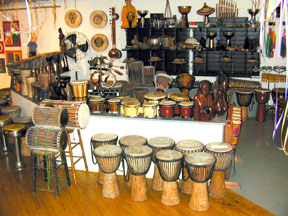
A
drum is a an instrument composed of a body or shell, usually
hollow with a stretched membrane, or skin. This means is falls
into the membranophone family, and can be traced back in time
at least 4000 years ago. Though few ancient examples of the
drum survived (being that they are often of perishable materials),
evidence of its existence are represented in art adorning
pottery, paintings, carvings, and cave paintings. Through
out time, the drum has been an instrument used in celebrations,
rituals, community building, entertainment, communication,
healing, and to march troops into battle.
Drums,
like people come in all shapes, sizes, colors, and voices!
So as a general classification, we can define drums into their
physical shape then their cultural decent. Body shapes in
the membranophone family include goblet, waisted, barrel,
long, conical, cylindrical, footed, vessel, frame, and friction.
The membrane is usually an animal skin, though synthetic are
also used. The skin / membrane is attached four different
ways, glued, nailed, pegged, or laced (Mali
Weave). The body or shell is composed of either wood,
ceramic, metal, or synthetic materials. Sizes and shapes of
drums vary as much as the diverse cultures that they hail
from, again making the instrument as unique as the player.
Sound
is created by striking the membrane with hands, sticks, padded
beaters or mallets. Basic sound made are the bass, tone, slap,
flam, and muffed bass, tone, or slap. It is important to remember
not to hurt yourself while drumming, removing rings from you
fingers, keeping good posture, and remembering to relax and
breath are essential. When playing music, it's important to
remember that you are not banging your instrument but making
music with it... Group ensembles can consist of Aerophones
(wind instruments), Idiophones ( bells, wood, shakers), Membranophones
(DRUMS!), and Chordophones (Stringed instruments). It is very
important to Look, Listen, and Communicate when playing in
an ensemble. So keep it fun, exciting, and above all enlightening!
By Creative, Constructive, Dialog, we can all share the joy
of a group music making endeavor!
Types
of Drums, goblet,
waisted, barrel, long, conical, cylindrical, footed, vessel,
frame, and friction.
Read
an excerpt from
FUNK &WAGNALLS INC.
Standard Dictionary of Folklore / Mythology and Legend ©1972
- by THERESA
C. BRADLEY
|